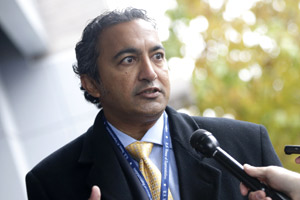 New Delhi, Sep 1: Indian-American US Congressman Ami Bera has said that seeing a member of the community as the President of the United States in his life time will be the true legacy he can leave behind.
New Delhi, Sep 1: Indian-American US Congressman Ami Bera has said that seeing a member of the community as the President of the United States in his life time will be the true legacy he can leave behind.
The 48-year-old California-born Democratic lawmaker, the only Indian-American currently serving in Congress who made his first visit to India after being elected to the office, feels more ethnic Indian people will rise and assume higher offices in the US in the coming years.
"If my legacy is inspiring, and if I can see in my lifetime, more Indian-American Congressmen in the House and if I can see an Indian-American Senator in my lifetime. And, if I can see an Indian-American President in my lifetime, that will be my true legacy," Bera told PTI here in an interview, during his recent India trip.
Bera's father hailed from Gujarat and migrated to the US in 1950. He is the third Indian-American — after Dalip Singh Saundh in 1950 and Bobby Jindal in 2005 — to have been elected to the House of Representatives, the lower house in the US legislature.
The lawmaker who counts Mahatama Gandhi, Martin Luther King and Nelson Mandela as inspirations said that more Indian-American joining politics and rising would only be a "natural progression".
"I see so many Indian-Americans in the hallway in the Congress and people rising and assuming higher offices would only be a natural progression for the community that has risen on the core values imbibed across generations," Bera said.
Indian Americans numbering 3.2 million is the third largest Asian American community in US after Chinese Americans (3.8 million) and Filipinos (3. 4 million).
"Qualities of family, qualities of a strong sense of community, qualities of sacrificing so that your children can have a better future...and those are not just Indian or Indian-American qualities but those are qualities that every parent or families stood out for, is what made us.
"I think it takes tremendous courage to leave a small village in Gujarat and go to a country where you don't have anything and where you don't know anyone... that is a story that is told over and over in our community... and, we should not forget those stories," Bera added.
The lawmaker called the "reverse migration" happening from US to India currently as one of the exciting phases for the Indian-Americans.
"I think the first generation who had left..their children who studied in America, are coming back..because many things like doing a start-up is easier here..so they are making their innovation here and it is important that it is documented," he said.
He emphasised that next generation of Indian-Americans will redefine the Indo-American relationships.
"Indo-American relationships will be one of the defining partnerships of the 21st century and the next generation of the Indian-Americans will further redefine it. And those Indian-Americans, who are born and raised in US, will play a greater role in that," he said.
The US lawmaker, who called the Indian-American community as the "marriage of best of both the worlds", said this was the time for them to give back to America.
"I am only here because of the opportunities other have made for me, and those are also American qualities...I think if we embrace who we are and embrace those qualities we can be successful," he said.
During his week-long trip, Bera visited Mumbai, New Delhi and Bangalore, where he met business leaders from both American and Indian companies to strengthen the trade relationship between the two countries.





Comments
Add new comment